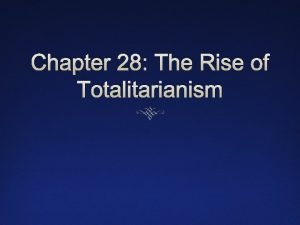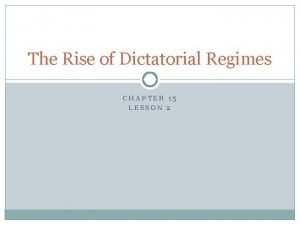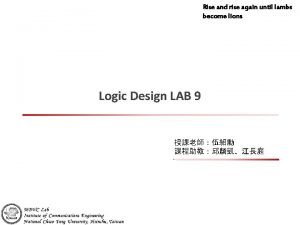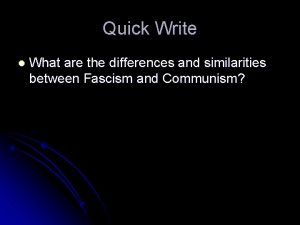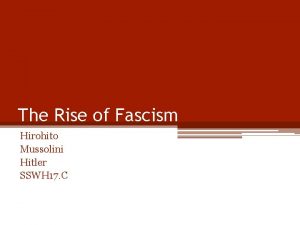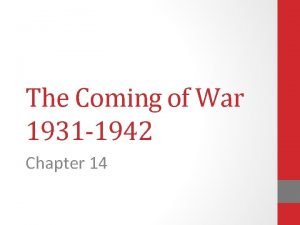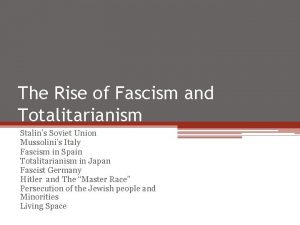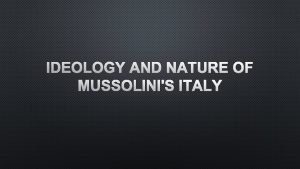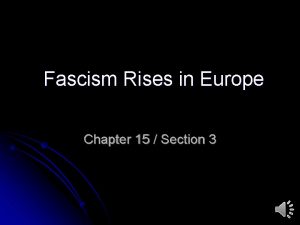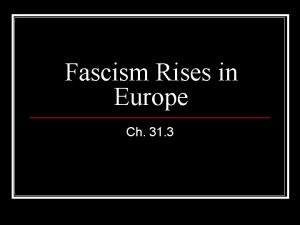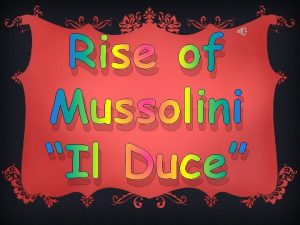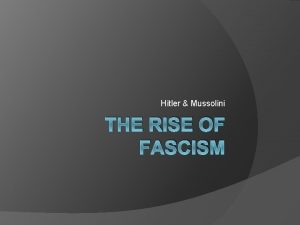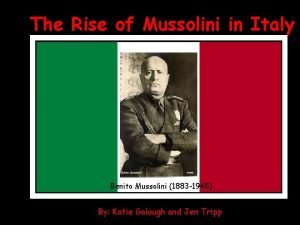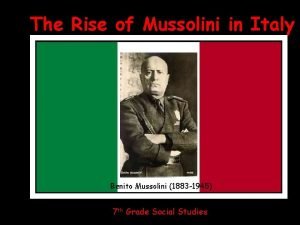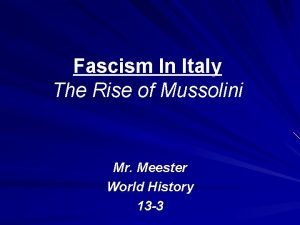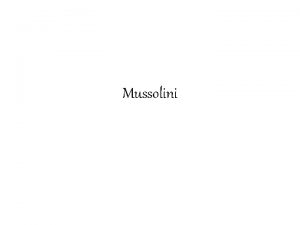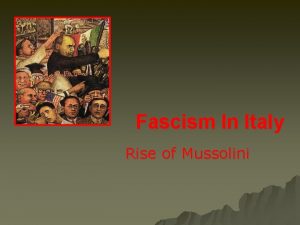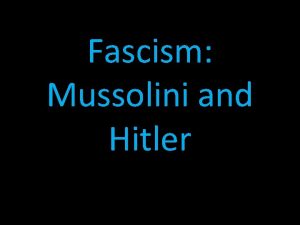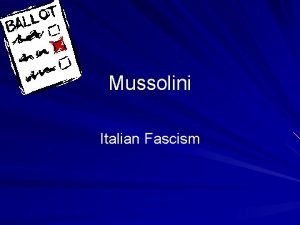Rise of Mussolini and Fascism Italy in World
















- Slides: 16

Rise of Mussolini and Fascism

Italy in World War I Alliance with Britain and France supported by right; divided the left Against (PSI): war was an “imperialist war” For: war would destroy liberal Italy and foster revolution Treaty of London signed by Antonio Salandra (1915) Antonio Salandra Prime minister of Italy

Benito Mussolini Leading member of PSI Formed the fasci di azione during World War I Began supporting the war in October 1914 Eventually expelled from the PSI and his newspaper Avanti! Served in army until injury sent him home in 1917 Formed his first Fascist units, the Fascio di combattimento in 1919

Impact of WWI Supported by right; divided the left Italy suffered terrible losses against Austria~600 k casualties Politically divisive Italian government accused of mismanaging the war Increase in industrial workers meant increased trade union and PSI membership

Weakened Liberal Italy Liberal government 1918 -1922 started losing control Liberals had fewer than half the seats in the chamber Short-term governments undermined credibility of the democratic system

Weakened Liberal Italy Further weakened by the “mutilated victory” of WWI Prime Minister forced to resign after failure to secure territories at Versailles Prompted widespread disgust Strengthened Wide Fascist Party appeal (no clear doctrine) Demanded strict law and order

Fiume Affair Territory of Fiume occupied by exsoldiers (1919) Controlled by Yugoslavia (agreed to by Italian government) Government unable to remove D’Annunzio Affair undermined credibility of Italian government

Biennio Rosso “Two Red Years” Extensive unrest in Italy (1919 -1920); attempted socialist revolution Response to high inflation, unemployment, and the fear of communism Italian Communist Party rose from turmoil Anarchism and Socialist groups saw massive increase in membership


The Blackshirts Disgruntled Benito nationalist ex-soldiers Mussolini’s private military Organization reminiscent of Roman military Targeted “threats to Italy” Socialist organizations, leftist press, and union workers Slowly reduced gained widespread support from Italians


Increased Support of Fascism Support passed to Fascist party Willing to use violence against communists and socialists Complicity from police and army in restraining Blackshirts Also supported by the church Pius XI saw Mussolini as a means of improving the position of the church • Wealthy industrialists • Landowners

Economic Policies Designed for self-sufficiency, also referred to as “autarky” Address economic weaknesses of Italy Productivism High industry favored over consumer goods High taxation to fund development

Corporate Statism Alternative Italian Government to capitalism and socialism Corporations act as policy makers Workers and owners work towards the good of the state In Company A Steel Corporation practice, labor was exploited Company B

Battle for Grain Battle for the Lira Increase Lira Imports Exports in grain production fall by 75% Other key crops suffered Failed to challenge big landowners value goes from 154 -90 lira per pound fell No benefit to consumers (had to pay more for imported goods) Wages cut by 10% Mussolini’s Law 2/3 of unproductive land expropriated by state Removed control of the landowners

…Mussolini’s style and methods were quite different from those of his predecessors. Ignoring Italy’s economic and military weaknesses, he was impulsive, inconsistent and erratic. He valued prestige more than anything else and was never satisfied unless he was in the limelight playing a leading role. He was to become increasingly fond of making grandiloquent statements such as “better to live one day as a lion than a thousand years as a lamb, ” and declaring that war was not only inevitable but also desirable, adding “the character of the Italian people must be molded by fighting. ” With a “tendency to view European diplomacy through the eyes of a newspaper editor, ” he aimed at spectacular gestures without much thought for consequences, resulting in a foreign policy that has been described as “by turn ambivalent, futile and malignant. ” Patricia Knight, 2003, Mussolini and Fascism
 Define appeasement
Define appeasement Chapter 28 section 3 fascism in italy
Chapter 28 section 3 fascism in italy Chapter 15 lesson 1 the italian states answers
Chapter 15 lesson 1 the italian states answers Tricky dick: the rise and fall and rise of richard m. nixon
Tricky dick: the rise and fall and rise of richard m. nixon Rise and rise again until lambs become lions
Rise and rise again until lambs become lions Rise again and again until lambs
Rise again and again until lambs A union b example
A union b example Describe the similarities between fascism and communism
Describe the similarities between fascism and communism Hitler hirohito mussolini
Hitler hirohito mussolini According to interventionists how would aiding
According to interventionists how would aiding Totalitarianism vs fascism
Totalitarianism vs fascism Fascism vs totalitarianism
Fascism vs totalitarianism Stages of fascism
Stages of fascism Chapter 15 section 3 fascism rises in europe answer key
Chapter 15 section 3 fascism rises in europe answer key Chapter 31 section 3 fascism rises in europe
Chapter 31 section 3 fascism rises in europe Principles of facism
Principles of facism Fascism vs totalitarianism
Fascism vs totalitarianism

